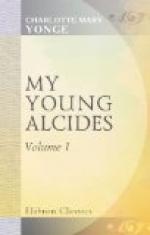“So,” said George Yolland, as he told me, “the poor fellows’ hearty way was almost more than one could bear, but I knew Alison would have me try to turn it to some sort of good to themselves; so I stood up and said I’d take it on one condition only. They knew very well what vexed Mr. Alison most in themselves, and the example he had set—how he had striven to make them give up making beasts of themselves. Wouldn’t they think with me it was insulting him to let a drunkard have a hand in doing a thing to his memory? So I would manage their collection on condition they agreed that whoever took more than his decent pint a day—or whatever else sober men among them chose to fix it at—should have his money returned on the spot. Poor fellows, they cheered and said I was in the right, but whether they will keep to it is another thing.”
They did keep to it. All that winter, while the chapel was building, there were only five cases in which the money had to be returned, and two of those took the pledge, pleaded hard, and were restored. Indeed, I believe it was only the habitually sober who ventured on the tolerated pint. Of course there were some who never came into the thing at all, and continued in their usual course; but these were the dregs, sure to be found everywhere, and the main body of the Hydriot potters kept their word so staunchly, that the demon of intoxication among them was slain by those Samson windows, as Harold had never slain it during his life.
Beautiful bright windows they are, glowing with Samson in his typical might, slaying his lion, out of the strong finding sweetness, drinking water after the fight, bearing away the gates, and slaying his foes in his death. But Samson is not there alone. As the more thoughtful remarked, Samson was scarce a worthy likeness for one who had had grace to triumph. No, Samson, whose life always seems like a great type in shattered fragments, must be set in juxtaposition with the great Antitype. His conflict with Satan, His Last Supper, His pointing out the Water of Life, His Death and His victory over death, shine forth, giving their own lesson of Who hath won the victory.
We ventured to add two little windows with St. George and St. Christopher, to show how Christ’s soldiers may follow in the conquest, treading down the dragon, and bending to the yoke of the Little Child who leads them out of many waters.
That winter of temperance proved the fulcrum that had been wanting to the lever of improvement. Schools of art, concerts, lectures, choir preparation, recreation, occupation, and interests of all sorts were vigorously devised by the two Yollands; and, moreover, the “New Dragon’s Head” and the “Genuine Dragon’s Head,” with sundry of their congeners, died a natural death by inanition; so that when the winter was over, habits had been formed, and a standard of respectability set up, which has never entirely fallen, and a spirit




